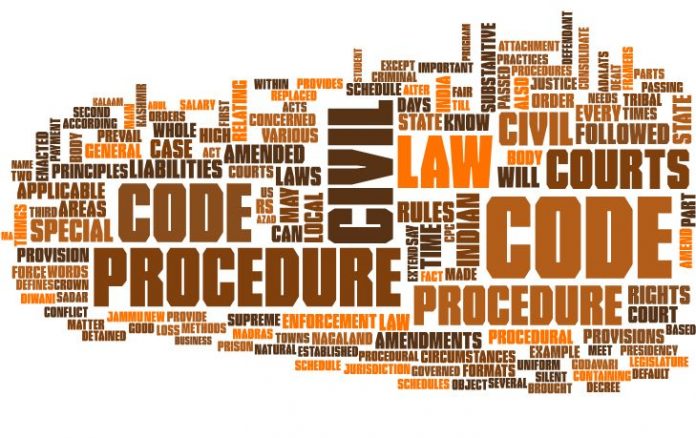This article has been written by Jashandeep Kaur pursuing a Diploma in Advanced Contract Drafting, Negotiation and Dispute Resolution and edited by Shashwat Kaushik.
This article has been published by Sneha Mahawar.
Table of Contents
Introduction
A complaint is a written statement filed by the plaintiff before a court that has jurisdiction. It is filed to claim relief by the plaintiff. Therefore, it is very essential that the complaint be filed, disclosing all the causes of the actions and filed under the accurate jurisdiction of the court. Otherwise, the appellant may face rejection or return of the complaint, as the case may be. In this article, we will discuss the return of plaint. Under Order 7 Rule 10 of the Civil Procedure (Amendment) Act, 1976, the return of a plaintiff on the basis of incorrect jurisdiction is contained.
Return of plaint
- The return of the complaint is covered under Rule 10A of Order VII. Rule 10A and 10B were added to Order VII by the Civil Procedure (Amendment) Act, 1976.
- There are circumstances where the plaint is filed wrongly; it may lack some legal formalities or the court under whom it is appealed may not have jurisdiction to proceed over that case.
- So in these situations,the court has the power to return the complaint and may advise filing it under the correct jurisdiction.
Office Equipment vs. The Pradeshiya Industrial and… (1997)
- In this case, the petitioner filed a petition before the High Court of Delhi to appoint an arbitrator from this court for adjudicating disputes between the parties.
- The respondent filed a reply that the tender of the petitioner was accepted by him at his office in Lucknow so accordingly, the Delhi High Court has no jurisdiction to proceed over it.
- Therefore, it was held that the court in Lucknow has jurisdiction to try and decide the proceedings. The complaint, under Order 7 Rule 11 of the Code of Civil Procedure, was returned to the plaintiff.
Grounds for returning a plaint
The court can return the complaint only on one ground, i.e., its jurisdiction.
Jurisdiction of courts
Jurisdiction means any authority conferred by the law upon the court, tribunal or judge to adjudicate the dispute between the parties. Different courts have different powers, rights, authority and territorial limits to exercise.
Section 9 of the Code of Criminal Procedure deals with the jurisdiction of the courts. It says all civil cases are triable under this section unless they are barred.
Territorial jurisdiction
Territorial jurisdiction can be explained as:
- The local courts under whose further immovable property lies will deal with issues related to that property. Issues such as rent, partition, sale, redemption rights, etc
- If the property is situated within more than one court’s jurisdiction, the case can be filed under either of the courts under which that property lies.
- In the case of movable property, either the court under whose jurisdiction the damages have occurred can proceed with the case or the court under whose jurisdiction the defendant resides can proceed with the case.
- In cases of matrimonial disputes, the particular court has jurisdiction either where the dispute arises, where the plaintiff resides where respondent resides or where the marriage was solemnised.
Pecuniary jurisdiction
Section 15 of the Code of Civil Procedure says that every case should first be filed with the lower court, which is competent to try such a case. The cost amounting to suits is tried accordingly by the court, which has the power to do so.
Subject matter
There are courts that are authorised to try some particular cases only; they can not hear all kinds of cases. Such as family courts have power to proceed over issues related to Hindu law, matrimonial cases, etc.
Jurisdiction in respect of a person amenable to military law.
Procedure for returning a plaint
Order 7 Rule 10
It describes the procedure for returning a complaint. The judge or the court can return the complaint only on the grounds mentioned under Sections 15 to 20 of the Civil Procedure Code. While doing so, the judge has to mention the following in his order.
- The date on which the petition is presented and date on which it is returned should be mentioned on it.
- The names of the parties presenting the complaint should be mentioned.
- A brief statement is given to the plaintiff, mentioning the reasons for returning it.
- The plaintiff can also be returned by the court on the request of the plaintiff if the court is satisfied.
Nanikutty Amma Devanki Amma and others vs. Krishnan Kochunarayanan Nair and Ors. (2007)
In this case, respondents 1 to 3 filed a complaint in a district of Thiruvananthapuram, showing that the court of Thiruvanthapuram has jurisdiction to exercise the suit related to their property. The petitioner, in order of protection, filed an EX.2 written statement and challenged the complaint of the respondents, stating that the properties are situated within the local limits of the court at Attingal and the valuation showed that it was only Rs. 25,000. Therefore, only the Munsiff Court has jurisdiction to exercise this suit.
Therefore, the plaint filed by respondents 1 to 3 was returned by the district court by endorsing “returned for want of jurisdiction and the written statement filed by the petitioner was also given to them.”
Shaw Wallace and Co. Ltd. vs. M.P. Beer Products Pvt. Ltd. (2008)
In this case, the plaint was also returned by the Delhi High Court on the basis of a lack of jurisdiction. The Court found that Shaw Wallace had no registered office in Delhi. Their office is in Mumbai, and M.P. Beer products are in Madhya Pradesh. Hence, no cause of action was raised in Delhi.
Rule 10A
Rule 10A of Order 7 of the CPC defines the powers of courts to fix a date for the appearance of the plaintiff in his court after he returns his/her complaint in the following cases:
1.Intimation: Where the court feels that it does not have jurisdiction to try the suit, it shall inform the plaintiff of its decision before doing so.
Application
- After getting the notification for return of the complaint, the plaintiff may submit an application to the court mentioning the name of the court in which he intends to file the complaint once it has been returned.
- He may pray to the court to fix a date for his appearance in the particular court.
- Requesting the court to send notice of the date to both parties.
3. Court’s obligation- If the plaintiff files an application regarding date fixation and serving notice, then the court, before returning the plaintiff, should:
- fix a date for both parties to appear before the court, which has jurisdiction, and
- give notice of date of appearance to both parties.
Under subrule 4 of rule 10A, it is not necessary to serve summons to the defendant for appearing before the court that returned the complaint, unless there is a reason to do so.
Notices served by the court to appear are considered summonses.
Manipal University vs. Manipal Academy Of Health (2018)
In this case, the issue arises that, is it correct for the trial court to grant the plaintiff’s application for the return of the plaint without adhering to the steps outlined in Order 7 Rule 10A of the CPC? and whether the trial court has been stripped of its authority to hear the case.
Therefore, it was held that this issue of the rule of convenience can not be stretched too far to allow reliance on extraneous factors while deciding the question of geographical jurisdiction. The Apex Court says the court is invalidated because the trial court failed to follow the instructions of subrule 2 of Rule 10A of Order 7 of CPC, which amounts to procedural irregularities.
Saleem Ahmed vs. Khursheed (2016)
In this case, the trial court did not follow the procedure according to Order 7 Rule 10A of the CPC.
Rule 10B – Transfer of suit
- This rule empowers the court to transfer suit to the proper court.
- When the plaintiff files an appeal against the order of return, the court may direct the plaintiff to file a complaint with the court, which has jurisdiction to try that suit and may also fix an appearance date for the same.
- The court shall do this without being prejudiced.
De Novo trial
Trial de novo means a fresh / new trial in the same case but before a different trial court. The whole case is retried as if it had never been tried earlier.
M/S Exl Careers vs Frankfinn Aviation Services Pvt. … (2019)
- In this case, the issue was wheather the trial in the court where the complaint is now filed starts De Novo after its return under Order 7 Rules 10 and 10A or wheather it is to be continued from the same stage at which it was returned.
- The plaintiff filed a suit for recovery against Frankfinn Aviation Services Pvt. at the Girgaon court. The defendant filed an application saying that the action was caused in Meerut instead of Gurgaon and that the defendant was not a resident of Gurgaon.
- It was held that Gurgaon court does not have jurisdiction to try this case and parties should confer exclusive territorial jurisdiction in Delhi courts. Hence, the revision petition was allowed.
Conclusion
Therefore, from the above discussion in this article, we have learned that it is necessary to file a complaint in an accurate jurisdiction. If the complaint is filed in another court, then the plaintiff may have to face some delay in justice. If the plaintiff, without lack of knowledge, by mistake or for any other reason, falls within the wrong jurisdiction, then that court has the power to return the application at any stage of its proceedings and may direct it to the accurate court, appointing a date of appearance for the party. The jurisdiction of the court can be seen from sections 16 to 20 of the civil procedure code. The returned plaint is not considered a rejected plaint or null/void it has validity. The De Novo facto applies to the returned plaint. Any complaint that was returned by one court can be started afresh or continued from the same stage of the proceedings.
References
- https://www.advocatekhoj.com/library/bareacts/codeofcivilprocedure/orderVII.php?Title=Code%20of%20Civil%20Procedure,%201908&STitle=Plaint
- https://www.lawnotes4u.in/return-of-plaint-o-7-r-10-cpc/
- https://blog.ipleaders.in/procedure-drafting-filing-plaint-suit/
- https://lawwatch.in/return-of-a-plaint-under-civil-procedure-code/
- https://www.legalserviceindia.com/legal/article-7119-plaint-written-statement-set-off-and-counter-claim-under-civil-procedure-code-1908.html
Students of Lawsikho courses regularly produce writing assignments and work on practical exercises as a part of their coursework and develop themselves in real-life practical skills.
LawSikho has created a telegram group for exchanging legal knowledge, referrals, and various opportunities. You can click on this link and join:
Follow us on Instagram and subscribe to our YouTube channel for more amazing legal content.
 Serato DJ Crack 2025Serato DJ PRO Crack
Serato DJ Crack 2025Serato DJ PRO Crack











 Allow notifications
Allow notifications


